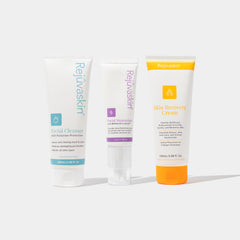The importance of the skin is severely underestimated一 just one of the main functions of skin is acting as our bodies’ first line of defense against microorganisms and radiation. Sounds pretty important to us.
For some reason, however, when talking about skincare, we almost always end up talking about the aesthetic side of skin, mainly focusing on the face, and not much more. But our skin covers our entire body, and every inch of it is important. So if you’re looking to learn how to improve skin health in your own life, it’s time to look beyond the face.
What Are The Main Functions of Our Skin?
Our skin does many jobs for us, besides keep all of our insides in. It’s a first defense against extreme heat or cold, chemicals, radiation, and so on. It helps control & stabilize our body temperature. It’s a reservoir for storing much of our body’s blood. Nerve ending and receptors that allow us to feel things help us experience the world. And it helps produce vitamin D, a vital nutrient throughout the body.
What Things Affect The Function Of Our Skin?
Since skin is such a widespread tissue type, it makes sense that many factors would affect how well this organ functions. For example, as we age, our skin loses its elasticity and structure. This leads to sagging, easier scarring, and stretching.
Pollution can also have an effect on our skin; microscopic particles called pollutants penetrate into the deeper layers of our skin and disrupt the function of the cells.
The onslaught of attackers doesn’t stop there, though. The weather also plays a huge role in our skin’s health; dry skin is more susceptible to damage, infection, and scarring. In addition to this, the sun, too, can be a source of damage. Ultraviolet radiation can cause changes to the DNA of skin cells, as well as physically burning the cells. It’s important to keep our skin moisturized and protected from the elements whenever we go out.
Finally, like other parts of our body, the skin’s health is intimately tied to how well we care for ourselves. Diet, water intake, and exercise are all incredibly important in maintaining healthy skin. When we eat a poor diet, don’t drink enough water, and don’t get enough exercise, our bodies will respond in kind. Bearing all these things in mind, let’s take a look at some of the best skincare tips for attaining and maintaining healthy skin.
Some Skincare Tips for Healthy Skin
Tip #1: Wear Sunscreen
UV radiation is incredibly dangerous to our skin. Enough UV radiation can cause changes to the DNA in our skin cells, leading to cancer. You can protect your skin from the harmful rays of the sun by wearing an appropriate sunscreen.
Tip #2: Clean Your Skin Properly
Another thing you can do to protect your skin and promote a healthy outermost layer is this: clean your skin with quality products that will help reverse aging and pollution-related damage. We’re (perhaps) a bit biased, but we love our Anti-pollution Facial Cleanser for both general cleansing and anti-pollution-related cleansing. Your skincare routine should contain a high-quality cleanser; this product will help make sure you’re starting your routine with a fresh, clean layer of skin.
Tip #3: Avoid Damaging Products and Sun
Don’t take this the wrong way: some sun is good for your body. Our skin naturally reacts to the sun’s light and produces vitamin D. However, too much of a good thing can be dangerous. If you have to be out in the sun for a long period of time, make sure to wear appropriate clothing and lather on the sunblock. Furthermore, take care to avoid skincare products that are too harsh on your skin; some topical acne creams and cleansers fall into this category. Be careful not to over-stimulate your skin with products like exfoliators, too.
Tip #4: Drink Plenty of Water
It’s not just your skin that needs enough water to function properly - your brain and other internal organs also require enough liquid! Make sure you drink an appropriate amount of water on a daily basis; 64-80 ounces is a great start for most adults. Dehydration can cause compounding issues for your health.
Tip #5: Check Your Skin for Abnormal Spots
Once every few months, or more often if skin cancer runs in your family, you should be checking your skin for signs of skin cancer. Abnormally-shaped moles and reddish lumps should be checked by a professional; if you have a cancerous skin mass removed, make sure to use an appropriate scar product (like Scar Esthetique Silicone Scar Cream or RejûvaSil Silicone Scar Gel) that will help your skin heal as well as possible.





















Leave a comment